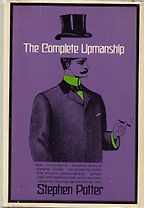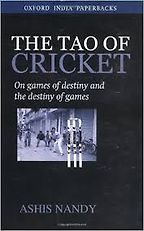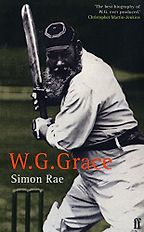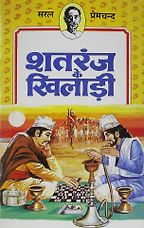Tell me about your first book Stephen Potter’s The Complete Upmanship.
This book is seminal in the history of sports writing. What I really like about his writing is that he is half serious and half humorous. He actually claims to have coined the word gamesmanship.
What did he mean by that?
Well, he was part of this somewhat stereotypical group of white English middle- to upper-class men in the early 20th century who were interested in sports. He played tennis, golf, cricket and ping pong. And among this group there was this whole concept of sportsmanship and doing the right thing when you are playing a game. But he moves that idea on to gamesmanship.
He came up with this idea that there are certain unwritten rules that make you a good sportsman but to be a good gamesman you go all out to use the rules to your advantage in order to win, regardless of whether it is seen as ‘sporting’ or not. It is not cheating but it is a grey area which for many was seen as being outside convention, much like the genre which Potter made his own.
And what about today with things like match fixing in Pakistan – how do you think sportsmanship is doing against gamesmanship?
When I think about cheating, for me it is almost a primal desire to win at all costs. Match fixing can be seen as the complete opposite of that. It’s all about money. Cheating is not about money; it is about winning at all costs. So for me match fixing has nothing to do with gamesmanship. It is about accepting a bribe to under-perform or perform to order. Coming back to cheating, you think of times like when Maradona scored that famous hand goal against England – that was cheating but driven by the primal desire and naked ambition to win at all costs.
What about your controversial next book, Open by Andre Agassi, which has some unexpected revelations from such a great sportsman?
I think Open is one of the best sport autobiographies I have ever read. It is obviously very interesting to find out about him taking recreational drugs and the effect it had on him. There was quite a bit of discussion within the tennis administration about stripping him of some of his titles because of that confession, and then they buried it under the carpet and moved on. But I think it was a very interesting confession to make so many years after the incident had happened. He was on crystal meth which is not a performance-enhancing drug but more for recreation. But even then, because it is not accepted within sport and especially in tennis, there was a lot of controversy around it. And I thought it was bold of him to talk about it.
There is another very interesting incident that he narrates in Open and that is his memory of a match he played when he was 13 or 14 against the American player Jeff Tarango who was a talented junior at the time, and he talks about how Tarango cheated in the game and how it shattered him as a boy. He carried that kind of grudge against Tarango all through his adult life.
What happened?
Well in those days during the junior matches, even if it was a fairly serious competition, there were no umpires or linesmen. Instead they relied on each other to call the balls out. Agassi mentions a critical final when Tarango called an obviously in ball out. Agassi was so taken aback that he lost the match.
What do you think the effect of cheating has on sports players and the people watching?
I think it is really ambiguous because it depends on who you support in a way. With most sports you react to opponents and people. In those kinds of situations you are not only up against your opponent but you are also playing against the rules. You are testing the limits of them to see how far you can get. That is what makes this discussion on sportsmanship and cheating very interesting. I think that the halo that surrounds sportsmanship is a bit of a construct and it is also an imperial construct.
The whole idea of sportsmanship started off in the middle of the 19th century and was in its prime until the early 20th century which was the peak of the Empire in a way. That is the time that all the rules of the sports were formulated in cricket, tennis and golf. A lot of other things were going on like the Bodyline series in cricket which again brings up this huge question about the role of sportsmanship in a game. A lot of these games came out of British public schools.
Do you think it’s time to revise the rules and do you see them as increasingly less relevant in today’s world?
The idea of sportsmanship is, as I said, very much a colonial construct which has always been contested by the colonised in many ways. The reason I mentioned my next book, The Tao of Cricket, is because Nandy shows the rise of Prince Ranjitsinhji, the Jam Sahib of Nawanagar, against the backdrop of the Empire. He looks at why this Indian prince made such progress within what was the rigid society in England in the early 20th century in terms of race, class and colour of skin.
So let’s move on to that book, The Tao of Cricket by Ashis Nandy.
Ashis Nandy is one of India’s most charismatic and in some ways controversial public intellectuals. He is by training a psychologist but he has written extensively on politics and sociology. In fact, this book is a very minor book by him. It is a slim volume, almost a pamphlet, but what makes it so interesting is that he brings his enormous erudition in politics and sociology to bear on the rise of Indian cricket.
He starts off his analysis with Ranjitsinhji. – who was also known as Ranji. India’s premier domestic cricket trophy is called the Ranji Trophy after him. He played for England and has some very famous English friends. C B Fry wrote about him extensively amongst others. He was a very charismatic right-hand batsman and a good bowler as well.
Nandy looks at the rise of Ranji and gives a very complete and interesting explanation of why Ranji was accepted within the English cricket establishment and why he was one of the front-ranking English cricketers of his time. He played for England, had a brilliant test record. But there is this very ambiguous relationship with Indian cricket. He did precious little to help Indian cricket or cricketers. When India started playing Test cricket he refused to play for them. By then he was past his prime but it would have been a great moral boost for the Indian team. Nandy thinks he wouldn’t play for any side that he knew would lose the game, and I think this business of not being willing to play for a side that he is sure will lose is an interesting case of not showing great sportsmanship. Because to be sporting you need to play the game for the game’s sake and here was Ranji refusing to do that.
He was an anglophile and he had very rigid notions if society’s structures. Because of his royal upbringing and background he had very little sympathy for the Indian nationalist movement and I think by not playing for India he was subverting the Indian nationalist movement. Nandy contrasts Ranji’s life, in passing, with that of Mohandas Karamchand Gandhi, born just three years earlier in nearby Porbander.
This is where you see what a strong link there is between sports and politics. Games are much closer to politics and warfare than arts or aesthetics. But when you are talking of sportsmanship it is a value which is akin to arts and aesthetics. You don’t talk about being a sport in politics or warfare. Pure games, without the sportsmanship, removes it from art and aesthetics and takes it far nearer to politics and warfare.
What about Simon Rae’s book W G Grace – is he one of your cricketing heroes?
Yes, this is an amazing biography. W G Grace is also a very interesting figure in the cricketing world. When we talk about sportsmanship cricket is one game that comes to the fore. You only have to think about the expression ‘it’s not quite cricket’, which puts the game on a different pedestal from other sports. For example you can contrast it with a fairly working-class game such as football where in general there seems to be more toleration of cheating, if you will, in terms of hand balls, etc!
W G Grace dominated the cricket world for a long time and he had a very ambivalent attitude towards the notion of sportsmanship, and that is what Simon Rae’s biography is looking at. The public perception of him is of an archetypal gentleman player. He was playing in the second half of the 19th century and the start of the 20th and that was the time when there was a big difference between the amateur players and the professionals.
Rae unpacks this idea of him being the gentleman amateur player and he uses this term called ‘shamateur’ when it comes to Grace. The idea being that he made a lot of money from cricket and all the while he was pretending to be an amateur gentleman player when he easily could have gone professional. There are many instances of him taking enormous liberties with the rules of the game. The best example, probably apocryphal, is when an umpire gave him out with an LBW and he simply walked up to the umpire and said, ‘People have come to watch me bat and not you officiate the game’!
Grace is a very iconic figure in this whole discussion of sportsmanship and cheating, especially as cricket is seen as superior to other games for whatever reason. And yet, as we have seen recently and throughout history, an element of cheating still goes on.
Absolutely and this throws up very interesting questions about the framing of the rules because the rules of cricket were framed in England with some cursory consultation with Australia. If you look at what happened in the 1970s and early 80s – when the West Indian pace bowlers started dominating the game quite brutally and ruthlessly – suddenly the ICC changed its rules around fast bowling. All sorts of rules were introduced to hamper the fast bowlers! Similar controversy erupted with Muralidharan when he had Australians and the English batsmen under his spell and umpires – always, incidentally, white men! – started no-bowling him for chucking! The coincidence is too much and I think the colour prejudice is alive and kicking in cricket, as in other sports.
Do you see that as a continuation of the imperialism of cricket?
Yes, I do, which is why I think this whole business of sportsmanship and imperialism goes hand in hand. I see it as an imperial value at heart invented to serve the rule-makers but not necessarily the rest of the Empire. Let’s not forget that ICC stood for Imperial Cricket Conference right up to the 1960s.
And do you think that Indian cricket is pulling away from its imperialist past?
I think it has done that well. There is this whole conflict within the ICC with Australia and England banding together and then the other block led by India with Pakistan and Sri Lanka and South Africa and the West Indies. I see it as colonial history playing itself out and the Empire is fighting back. I don’t think this reverse swing is the right thing to do. This international game should be governed in a more impartial way. But, if it comes down to a choice between England and India, I would happily vote for India because the game is so big here like football is in England.
Get the weekly Five Books newsletter
Your last choice is a short story called Shatranj Ke Khilari by Munshi Premchand which later got made into a film, The Chess Players.
Yes. Satyajit Ray’s film made the story very accessible worldwide. It is about two royal courtiers’ obsession with the game of chess and they are so absorbed in the game they have no time to look at their state affairs or their king being deposed. In fact, the game of chess is played out when the British are annexing the empire of Awadh. Not even the sight of their king, Wajid Ali Shah, being dragged through the streets by English soldiers could divert the attention of the two players from their game. But they end up killing each other when one accuses the other of cheating.
The irony is quite explicit about two courtiers (who are also soldiers) willing to kill each other over accusation of cheating in a game of chess, but who do nothing to stop their state from being annexed by the English. And the larger connection with sportsmanship is the idea that chess is a battle game a bit like empire building, but the British weren’t playing by the rules and being sportsmanlike. The characters are so engrossed in the chess game they fail to see what is going on around them. It is like they are too wound up with the smaller details and aren’t looking at the bigger picture. What is implicit in the story is they are so used to playing by the rules they can’t see that the British are moving outside the rules.
It is a very interesting juxtaposition of these two games, the Empire and chess. After all, that time in history is often referred to as the Great Game. The two princes are little pawns unable to save their land or their king. They get themselves killed because of an accusation of cheating in a game of chess but are unable to see that they were being cheated out of their own land!
November 2, 2010. Updated: September 9, 2023
Five Books aims to keep its book recommendations and interviews up to date. If you are the interviewee and would like to update your choice of books (or even just what you say about them) please email us at [email protected]
Five Books interviews are expensive to produce. If you've enjoyed this interview, please support us by donating a small amount.










